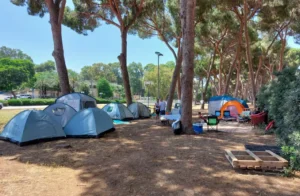“The goal is, first and foremost, to stop this madness,” said Golan, a resident of Pardes Hana.

A series of demonstrations are springing up across the country protesting the high cost of housing in Israel, which has increased significantly over the past few years. In Netanya, Beersheba and Pardes Hana (and with more cities expected to join in the coming days), people are leaving their apartments – in some cases, even forgoing renewal on their contracts – in favor of residing in tents in main public areas in order to raise awareness of the issue.
In Pardes Hana, a cluster of 12 tents occupied by families and individuals has popped up adjacent to a main thoroughfare over the course of the last week. Signs leaned against trees and hung from street lights decry the exaggerated expenses that Israeli residents have had to put up with. Protesters can be seen engaging in excited discussion with one another, resting beside their tents and playing with their young children.
“The goal is, first and foremost, to stop this madness,” said Golan, one of the compound’s residents. He noted that they plan to demonstrate in a variety of ways, including after-school activities for children, open-air music sessions and a public kabbalat shabbat ceremony. “[The goal is] that people will see and get the idea to come out to the streets, to come and commit to this cause.”
Golan explained that the steep housing cost is an issue affecting everyone, but it can be particularly damning for younger people without a lot of money. “I could call my mom and ask her to send me money in order to make rent, she has money – but that’s hers. Why should I be in a situation that requires me to take her money to pay rent?”
Keeping up with population growth
In recent years real estate supply has fallen quite short of demand. As a result of the pandemic, government municipalities were reluctant to approve new housing constructions, leading to only a fraction of the housing units required to meet demand being built in recent years.
“There haven’t been enough housing starts over time.”
Prof. Danny Ben-Shachar, Coller School of Management, Tel Aviv University
Even now, the government is racing to catch up on months of stunted growth, but the gap is wide, and it takes a while to build a house. Exacerbating the issue is the fact that, before new construction can even begin, the required land needs to be approved by the government, which can be a lengthy process in its own right.
“There haven’t been enough housing starts over time,” said Prof. Danny Ben-Shachar from the Coller School of Management at Tel Aviv University, in an interview with The Jerusalem Post earlier this week.
“Israel’s population growth is the highest among OECD countries, meaning that in order to fill the needs for new households, there needs to be around 55,000 to 60,000 new houses a year, and that needs to be continuous. [Housing] is not continuously, stably rising with the needs of the population,” he said.
“We’re all suffering from the same problem,” said Golan. “People say ‘it’ll be alright’ – it won’t. If we don’t stop this now, and if we don’t actively work to make it alright, then our children will definitely not be alright. It’ll only get worse.”
